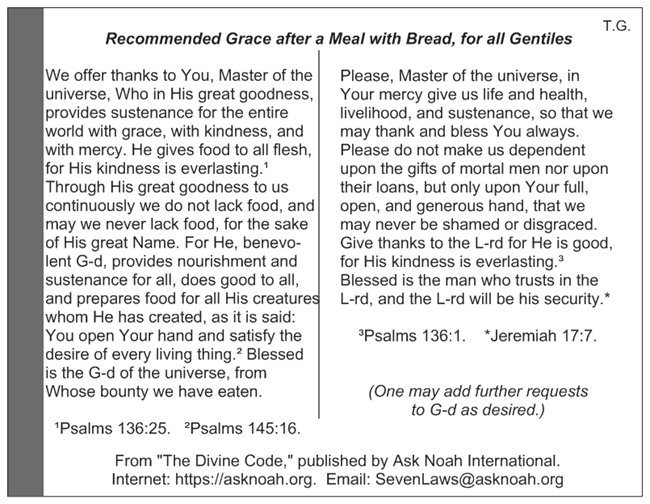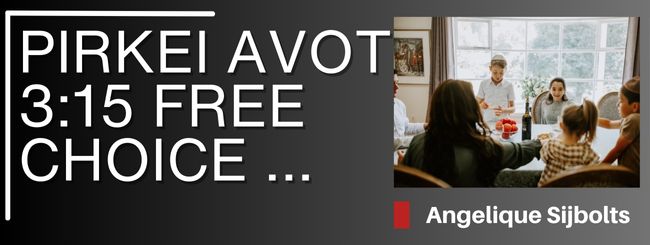בס”ד
הוּא הָיָה אוֹמֵר, הַכֹּל נָתוּן בְּעֵרָבוֹן, וּמְצוּדָה פְרוּסָה עַל כָּל הַחַיִּים. הַחֲנוּת פְּתוּחָה, וְהַחֶנְוָנִי מֵקִיף, וְהַפִּנְקָס פָּתוּחַ, וְהַיָּד כּוֹתֶבֶת, וְכָל הָרוֹצֶה לִלְווֹת יָבֹא וְיִלְוֶה, וְהַגַּבָּאִים מַחֲזִירִים תָּדִיר בְּכָל יוֹם, וְנִפְרָעִין מִן הָאָדָם מִדַּעְתּוֹ וְשֶׁלֹּא מִדַּעְתּוֹ, וְיֵשׁ לָהֶם עַל מַה שֶּׁיִּסְמֹכוּ, וְהַדִּין דִּין אֱמֶת, וְהַכֹּל מְתֻקָּן לַסְּעוּדָה
He used to say: everything is given against a pledge, and a net is spread out over all the living; the store is open and the storekeeper allows credit, but the ledger is open and the hand writes, and whoever wishes to borrow may come and borrow; but the collectors go round regularly every day and exact dues from man, either with his consent or without his consent, and they have that on which they [can] rely [in their claims], seeing that the judgment is a righteous judgment, and everything is prepared for the banquet.
Before Rosh Hashanah, it is customary to wish each other “Ketivah v’chatima tovah” (כתיבה וחתימה טובה), which means “A good inscription and sealing [in the Book of Life].” On the eve of Rosh Hashanah, the traditional greeting is “Leshana tovah tikatev v’tichatem” (לשנה טובה תכתב ותחתם), meaning “May you be inscribed and sealed for a good year.” From noon on Rosh Hashanah until Yom Kippur, it is appropriate to wish Jewish friends “Gemar chatimah tovah” (גמר חתימה טובה), which translates to “A good final sealing.” This greeting can also be extended to Noahides until Sukkot.
What we see in these wishes is the desire to be written in the book of life, or perhaps more correctly BOOK OF THE LIVING (Heb. סֵפֶר חַיִּים, Sefer Ḥayyim), a heavenly book in which the names of the righteous are inscribed. The expression “Book of Life” appears only once in the Bible, in Psalms 69: 29 (28), “Let them be blotted out of the book of the living; let them not be enrolled among the righteous.
In the Mishna (Avot 3:17), R. Akiva speaks in detailed terms of the heavenly ledger in which all man’s deeds are written down until the inevitable day of reckoning comes. Based on the aforementioned reference to the Book of Life in Psalms, however, or, according to another amora, from the supplication of Moses, the Talmud states “three books are opened in heaven on Rosh Ha-Shanah, one for the thoroughly wicked, one for the thoroughly righteous, and one for the interlopers. The thoroughly righteous are immediately inscribed in the Book of Life, the thoroughly unrighteous in the Book of Death, while the intermediary’s fate is suspended until the Day of Atonement” (RH 16b).[1]
We see a debit book in today’s mishnah. Some people enter G-d’s “shop” of their own free will and take “products” without paying for them. We use His universe without gratitude, without offering a bracha over the food, for a good (or bad) message, for the lovely nature, and so on. If we do not express thanks and do not pay our bills, our life may be filled with unpleasantness. But G-d only sends “nasty things” to remind people of their debt and make them pay it off. When the obligations are paid, He prepares a feast for all the world’s virtuous.
It is an obligation for Jews to give blessings (brachot) before partaking of any benefit this world has to offer. Neglecting a bracha is considered a transgression for a Jew. In Deuteronomy 8:10 we find the specific obligation for a Jew to say the bracha after a meal:
וְאָכַלְתָּ֖ וְשָׂבָ֑עְתָּ וּבֵֽרַכְתָּ֙ אֶת־ד’ אֱלֹקיךָ עַל־הָאָ֥רֶץ הַטֹּבָ֖ה אֲשֶׁ֥ר נָֽתַן־לָֽךְ׃
When you have eaten your fill, give thanks to your G-d Hashem for the good land given to you.
The question that may now arise is do Noahides have an obligation to say brachot?
We read the following in Bereishit Rabbah 49:4:
” Avraham would receive both the sinners and the ones that returned. As they were eating and drinking, he would say to them “bless!” They would ask: what should we say? He would answer: “Blessed is El Olam, from Whose [bounty] we ate.” If the person accepted it and blessed, then s/he would eat, and drink and go. And if not, then Avraham would say: ‘give me what you have.’ And the person would say – ‘what do you have that I owe you?’ And he would answer: ‘one measure of wine for ten coins, and one cut of meat for ten coins, and one loaf of bread for ten coins… Who gave you wine in the wilderness? Who gave you meat in the middle of the wilderness? Who gave you bread in the wilderness?’ Once the person understood the predicament that Avraham set up, then the person would say “Blessed is El Elyion from Whose bounty we ate” – and this is what is why tzedakah is written in the beginning and justice at the end. ” (See also Sotah 10[2])
However, Rabbi Moshe Weiner writes:
“Even though a Gentile is not commanded to bless G-d for the food that he eats, not before or after he eats, it is obvious by intellectual reasoning that a person should thank and bless G-d for giving him food, and also for giving him all his needs for existence.”[3]
We find in Berachot 35a that it is a logical obligation to bless G-d for benefit one receives from that which he bestows to the world:
“Rav Yehuda said that Shmuel said: One who derives benefit from this world without a blessing, it is as if he enjoyed objects consecrated to the heavens, as it is stated:
לַֽד’ הָאָ֣רֶץ וּמְלוֹאָ֑הּ תֵּ֝בֵ֗ל וְיֹ֣שְׁבֵי בָֽהּ
“The earth and all it contains is the Lord’s, the world and all those who live in it” (Psalms 24:1).”
The bracha that can be said after eating is the following

and can be found in booklet: Prayers, Blessings, and Faith for Noahides.
.Let us thank Him for all the good He gives to us as it belongs and not take from Him what is not given to us.
By Angelique Sijbolts
Sources:
[1] Jewish Virtual Library:1Book of Life
[2] Sotah 10b:1:
“… Abraham our forefather caused the name of the Holy One, Blessed be He, to be called out in the mouth of all passersby. How so? After the guests of Abraham ate and drank, they arose to bless him. He said to them: But did you eat from what is mine? Rather, you ate from the food of the G-d of the world. Therefore, you should thank and praise and bless the One Who spoke and the world was created. In this way, Abraham caused everyone to call out to G-d.”
[3] The Divine Code by Rabbi Moshe Weiner 4e edition p. 82
Texts: Sefaria.org
See also the blog: Parshat Ekev – Grace before and After a Meal
© Copyright, all rights reserved. If you enjoyed this article, we encourage you to distribute it further.
Our blogs may contain texts/ quotes or references of
Mechon-Mamre.org, Aish.com, Sefaria.org or AskNoah.org
that contain copyrights and which we may use with there permission.
